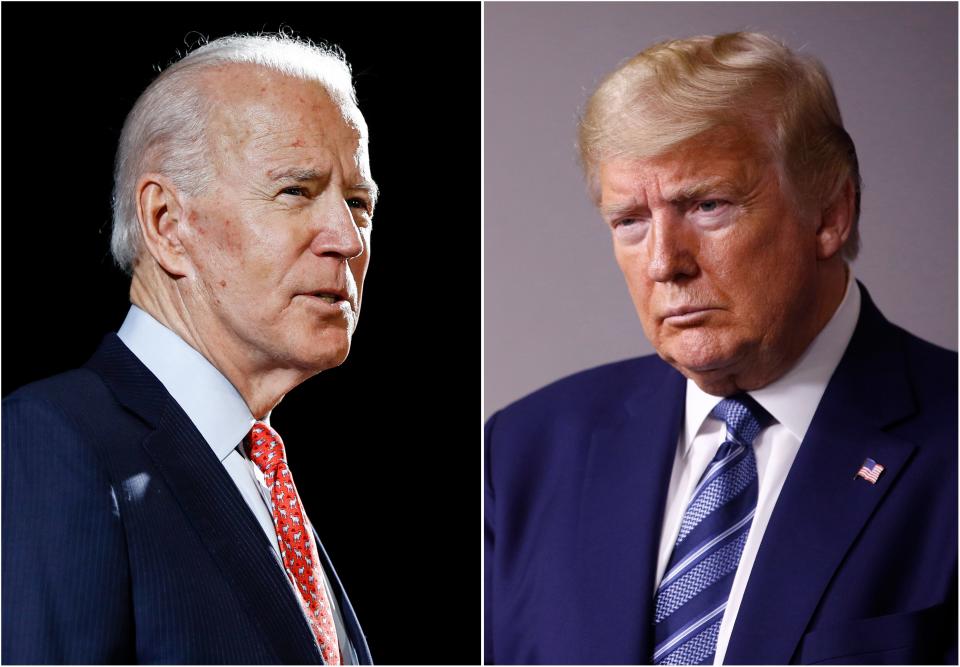Congress is set to certify Biden's election win Jan. 6. Here's what to expect.

After millions of votes and dozens of lawsuits, the end of the election is in sight: the final step to affirm President-elect Joe Biden's victory is this week.
Congress will meet Wednesday, Jan. 6 at 1 p.m. EST, to formally count the votes cast by the Electoral College – 306 for Biden, 232 for President Donald Trump. It takes 270 to win the White House.
The meeting, required by the U.S. Constitution, also marks one of the last opportunities for Trump and his allies to protest his loss.
For months, Trump has unsuccessfully tried to overturn election results in six battleground states, falsely claiming the election was stolen despite no evidence of widespread fraud.
The Supreme Court has twice refused to take up Trump-endorsed lawsuits that sought to reverse the results. Federal and state courts have also dismissed his claims of voter fraud nearly 60 times.
The joint session on Wednesday is all but certain to result in one more defeat for Trump, even though several of his Republican allies have indicated they will object to the certification of electoral votes for Biden.
Outside the Capitol, protests are expected by supporters of Trump.
Here's what to expect when the lawmakers meet.
What is the procedure for the count?
Members of the House of Representatives and U.S. Senate will meet in a joint session at 1 p.m. in the House Chamber. The procedures for the session come from the Electoral Count Act of 1887.
Vice President Mike Pence will preside in his role as president of the Senate. Leaders of both major parties will appoint lawmakers from both chambers to serve as "tellers."
Pence will open certificates of the electoral votes from each state – whose electors met to cast their ballots on Dec. 14 – and hand them to the tellers to read aloud. As they read a state's certificate, Pence will call for objections to the state's votes.

To be considered, objections must be made in writing and endorsed by at least one member of both the House and Senate.
Any objection that meets that criteria will result in a suspension of the joint session, at which time the House and Senate will convene separately to consider the issue.
The debate on each objection is limited to two hours. Each member may only speak for one, five-minute stint. After debate concludes, the House and Senate will vote.
A simple majority in both chambers is required to uphold the objection and throw out the state's votes. Short of that, the objection is disposed of and the state's electoral votes are counted as cast.
Rebecca Green, an election law expert at the William and Mary School of Law, told USA TODAY that “the sole purpose of this convening is for Congress to determine which ballots are the ballots that were certified by the states.”
"This is not a trial where Congress will look at evidence of fraud in the election," Green said. “There are no witnesses. There is no evidence presented. And there's a very limited opportunity to speak for that reason."
After all votes are counted, it falls to Pence to declare the winner of the election.
So far, Pence – who has not acknowledged that Trump lost his bid for reelection – has remained relatively quiet on his role in the electoral vote count process.
On Dec. 28, Republicans including Texas Rep. Louie Gohmert filed a lawsuit in federal court to authorize Pence to pick and choose which electoral votes to accept or reject. In a filing on Dec. 31, Pence asked the judge to dismiss the suit, which his brief called "a walking legal contradiction."
Legal experts have also predicted the suit will fail, saying it is a based on a far-fetched premise that the Constitution affords the vice president complete authority to decide an election.
Will there be any objections?
Multiple House Republicans have indicated that they will object to some state's electoral votes, citing alleged electoral fraud, though there is no proof to back any of their claims.
Rep. Mo Brooks, R-Ala., has led the charge. He and other conservatives met with Trump and Pence at the White House on Dec. 21 to discuss the effort.
After the meeting, Rep. Jody Hice, R-Ga., and Rep. Brian Babin, R-Texas, announced that they planned to object to electoral votes.
Others who have committed to object to votes include Rep.-elect Marjorie Taylor Greene, R-Ga., Rep. Lance Gooden, R-Texas, Rep-elect Ronny Jackson, R-Texas, Rep. Jeff Van Drew, R-N.J., Rep. Jeff Duncan, R-S.C, and Gohmert.
There are plans by "dozens" of House members to challenge the results in at least six states, according to Brooks.
“We’re going to sponsor and co-sponsor objections to the Electoral College vote returns of Michigan, Wisconsin, Pennsylvania, Georgia, Arizona, Nevada and maybe more depending on where we collectively want to go," he said on Fox & Friends.
Top Senate Republicans, including Majority Leader Mitch McConnell, have discouraged their members from backing objections to electoral votes.
McConnell, who himself has recognized President-elect Biden, told colleagues that an objection "isn’t in the best interest of everybody," according to a report from The Hill.
Nonetheless, Sen. Josh Hawley, R-Mo., announced on Dec. 30 that he plans to raise an objection to electoral votes in at least one state – Pennsylvania.
"I cannot vote to certify the electoral college results on January 6 without raising the fact that some states, particularly Pennsylvania, failed to follow their own state election laws," Hawley wrote on Twitter.
Hawley told reporters at the U.S. Capitol that "a number of offices have reached out" to say they, too, are interested in objecting.
"I don’t know yet," he said of whether more senators will join him. "I would think that there would be more, but there may not be, I don’t know. Too early to say."

Sen.-elect Tommy Tuberville, a Republican from Alabama, has also indicated he may object to some votes.
"You'll see what's coming," he said earlier this month. "You've been reading about in the House. We're going to have to do it in the Senate."
It's possible that some, but not all, of the objections raised by members of the House will obtain the backing of a senator. Each objection that receives both will elicit its own two-hour debate and vote, potentially turning the meeting into a marathon affair.
Have there been objections before?
There have been previous objections to electoral votes. At times, members of the House have attempted to raise objections without support from the Senate.
In 2017, half a dozen House Democrats objected to electoral votes for Trump, citing voter suppression and potential interference from Russia.
But Biden, then-vice president and president of the Senate, repeatedly slammed his gavel and rejected the effort, since they lacked a Senate sponsor.
“It is over,” he said, to applause from Republicans.
Just twice – in 1969 and 2005 – have there been objections that met the criteria to require the House and Senate to debate and vote.
In 1969, the objection was over a faithless elector from North Carolina who voted for George Wallace instead of Richard Nixon. It was rejected by both chambers.
In 2005, the objection was over electoral votes in Ohio, cast for George W. Bush.
Sen. Barbara Boxer, D-Calif., joined Rep. Stephanie Tubbs Jones, D-Ohio, in the action, which they said was to raise awareness about voter suppression.
"This objection does not have at its root the hope or even the hint of overturning the victory of the president," Tubbs Jones said at the time. "But it is a necessary, timely and appropriate opportunity to review and remedy the most precious process in our democracy."
The objection was roundly defeated, receiving a single vote in the Senate, from Boxer herself, and just 31 votes in the House, all from Democrats.

Could an objection succeed this year?
In short, no. Like previous objections, there is virtually no chance that any objections lodged will succeed.
The most straightforward reason the objections will fail is that they must be approved by both chambers, and Democrats control the House.
The Senate is harder to predict. The runoff for seats in Georgia that will determine control of the Senate is set to take place just a day before, on Jan. 5.
Before those members are seated, Republicans will maintain a majority.
Given the lack of support from leaders like McConnell, though, it's unlikely that Senate Republicans will rally behind an objection to the certification of Biden as the winner.
Earlier this month, Sen. John Thune, the No. 2 Senate Republican, told reporters that an objection "would go down like a shot dog" in the Senate.
"I just don’t think it makes a lot of sense to put everybody through this when you know what the ultimate outcome is going to be," said Thune, who is from South Dakota.
Other Republicans in the Senate have also indicated they disagree with Trump's continued efforts to overturn the election.
Sen. Ben Sasse, R-Neb., took to Facebook to rebuke GOP lawmakers who plan to participate in what he called a "dangerous ploy" on Jan. 6 to contest the results.
"For President-Elect Biden’s 306-232 Electoral College victory to be overturned, President Trump would need to flip multiple states. But not a single state is in legal doubt," Sasse wrote.
"All the clever arguments and rhetorical gymnastics in the world won’t change the fact that this January 6th effort is designed to disenfranchise millions of Americans simply because they voted for someone in a different party," he added. "We ought to be better than that."
Regardless of the outcome in the Senate, without the approval of the House, objections will not affect vote totals.
Though the challenges are doomed to fail, they will extend the vote counting process far longer than normal.
The joint session took just 23 minutes in 2013 and 41 minutes in 2017, according to the Congressional Research Service. Not this time.
If all six planned objections from the House receive support from a member of the Senate, total debate time could exceed 12 hours. Speaking to POLITICO, Brooks predicted that the proceedings will last even longer, clocking in at 18 hours.
If that's case, the meeting will wrap up sometime on Jan. 7 – and at long last, end the presidential election.
This article originally appeared on USA TODAY: Congress will count electoral votes on Jan. 6, formalizing Biden's win